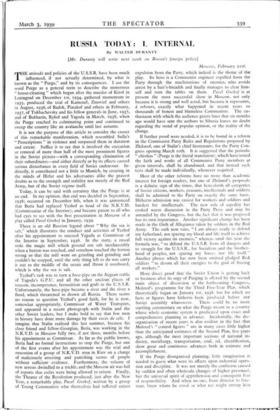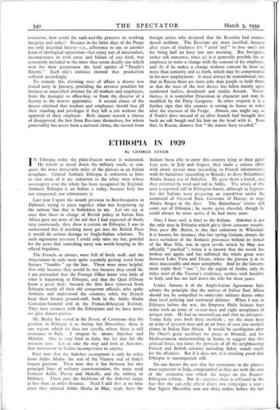RUSSIA TODAY : I. INTERNAL
By WALTER DURANTY
[Mr. Duranty will write next week on Russia's foreign policy] Moscow, February 21st.
THE attitude and policies of the U.S.S.R. have been much influenced, if not actually determined, by what is known as the " Purge," and by its consequences. I use the word Purge as a general term to describe the monstrous " house-cleaning " which began after the murder of Kirof in Leningrad on December 1st, 1934, gathered momentum in 1935, produced the trial of Kamenef, Zinovief and others in August, 1936, of Radek, Piatakof and others in February, 1937, of Tukhachevsky and his fellow generals in June, 1937, and of Bukharin, Rykof and Yagoda in March, 1938, when the Purge reached its culminating point and continued to sweep the country like an avalanche until last autumn.
It is not the purpose of this article to consider the causes of this remarkable manifestation, which resembled Sulla's " Proscriptions " in violence and surpassed them in duration and extent. Suffice it to say that it involved the execution or removal of more than half of the most prominent figures in the Soviet picture—with a corresponding elimination of their subordinates—and either directly or by its effects caused serious disturbance in every field of Soviet endeavour. In- directly, it contributed not a little to Munich, by creating in the minds of Hitler and his adversaries alike the gravest doubts as to the strength and stability not merely of the Red Army, but of the Soviet regime itself.
Today, it can be said with certainty that the Purge is at an end. In my opinion, that end was decided in September, 1938; occurred on December 8th, when it was announced that Beria had replaced Yezhof as head of the N.K.V.D. (Commissariat of the Interior); and became patent to all who had eyes to see with the first presentation in Moscow of a play called Pavel Grekof in January, 1939.
There is an old Russian legend about " Why the sea is salt," which illustrates the conduct and activities of Yezhof after his appointment to succeed Yagoda as Commissar of the Interior in September, 1936. In the story, a rascal stole the magic mill which ground out salt inexhaustibly when a button was touched, and somehow touched the button wrong so that the mill went on grinding and grinding and couldn't be stopped, until the only thing left to do was carry it out to the middle of the ocean and throw it overboard, which is why the sea is salt.
Yezhof's task was to turn a hose-pipe on the Augean stable of Yagoda's G.P.U. and all the other unclean places of treason, incompetence, favouritism and graft in the U.S.S.R. Unfortunately, the hose-pipe became a river and the river a flood, which threatened to drown all Russia. There seems no reason to question Yezhof's good faith, for he is now, somewhat appropriately, Commissar of Water Transport, and appeared in a recent photograph with Stalin and the other Soviet leaders, but I make bold to say that few men in history have done more damage by their exces de zele. I imagine that Stalin realised this last summer, because his close friend and fellow-Georgian, Beria, was working in the N.K.V.D. in Moscow fully two, if not three, months before his appointment as Commissar. As far as the public knows, Beria had no formal instructions to stop the Purge, but one of the first events after his appointment was the trial and execution of a group of N.K.V.D. men in Kiev on a charge of maliciously arresting and punishing scores of people without sufficient evidence. Furthermore, the volume of new arrests dwindled to a trickle, and the Moscow air was full of reports that exiles were being allowed to return. Finally, the Theatre of the Revolution produced, just after the New Year, a remarkable play, Pavel Grekof, written by a group of Young Communists who themselves had suffered unjust expulsion from the Party, which indeed is the theme of the play. Its hero is a Communist engineer expelled from the Party through the machinations of enemies, who avoids arrest by a hair's-breadth and finally manages to clear him- self and turn the tables on them. Pavel Grekof is at present the most successful show in Moscow, not only because it is strong and well acted, but because it represents, a rebours, exactly what happened in recent years to thousands of honest and blameless Communists. The en- thusiasm with which the audience greets lines that six months ago would have sent the authors to Siberia leaves no doubt regarding the trend of popular opinion, or the reality of the change.
If further proof were needed, it is to be found in a reform in the Communist Party Rules and Regulations proposed by Zhdanof, one of Stalin's chief lieutenants, for the Party Con- gress opening March loth. It is suggested that the periodic " chistkas " (Purge is the literal translation), which have tested the faith and works of all Communist Party members at given intervals, shall be abandoned, and that instead such tests shall be made individually, whenever required.
Most of the other reforms have no more than academic interest for foreign readers, but one of Zhdanof's proposals is a definite sign of the times, that henceforth all categories of Soviet citizens, workers, peasants, intellectuals and soldiers shall be admitted to the Party on exactly the same basis.
Hitherto admission was easiest for workers and soldiers and hardest for intellectuals. The new rule of equality has evoked warm discussion in the Party Press and may be amended by the Congress, but the fact that it was proposed has its own importance. Another significant change has been made in the Oath of Allegiance taken by soldiers in the Red Army. The oath now runs, " I am always ready to defend my fatherland, not sparing my blood and life itself to achieve full victory against its enemies," whereas until this year the formula was, " to defend the U.S.S.R. from all dangers and to struggle for the U.S.S.R., for Socialism and the brother- hood of peoples, not sparing my forces nor life itself." Another phrase which has now been omitted pledged Red soldiers " to devote all their energies to the goal of freeing all workers."
More direct proof that the Soviet Union is getting back to business after its orgy of Purging is offered by the second main object of discussion at the forthcoming Congress, Molotof's programme for the Third Five-Year Plan, which theoretically began on January 1st, 1938, but for which no facts or figures have hitherto been produced before any Soviet assembly whatsoever. There could be no more startling commentary on what the Purge meant to a country whose whole economic system is predicated upon exact and comprehensive planning in advance. Incidentally, the dis- organisation of recent years is also evident in the fact that Molotof's " control figures " are in many cases little higher than the anticipated estimates of the Second Plan, five years ago, although the most important sections of national in- dustry, metallurgy, transportation, coal, oil, electrification, show great and continuous advances both in estimate and accomplishment.
If the Purge disorganised planning, little imagination is needed to guess what were its effects upon industrial opera- tion and discipline. It was not merely the confusion caused by sudden and often wholesale changes of higher personnel, but the universal spirit of apprehension and consequent fear of responsibility. And when no one, from director to fore- man, knew where he stood or what net might entrap him tomorrow, how could the rank-and-file preserve its working integrity and order? Because in the latter days of the Purge not only doctrinal heresy—i.e., adherence to one or another form of ideological opposition—but every sort of misconduct, incompetence or even error and failure of any kind, was commonly included in the more than seven deadly sins which won for their perpetrator the fatal epithet of " People's Enemy." Each day's statistics showed that production suffered accordingly.
To remedy this alarming state of affairs a decree was issued early in January, providing the severest penalties for lateness or unjustified absence for all workers and employees, from the manager to office-boy, or from the director of a factory to the newest apprentice. A second clause of the decree enjoined that workers and employees should lose all their standing and privileges if they left a job without the approval of their employer. Both clauses roused a chorus of disapproval, the first from Russians themselves, for whom punctuality has never been a national virtue, the second from foreign critics who declared that the Kremlin had reintro- duced serfdom. The Russians are more justified, because after years of slackness it's " crool 'ard " to lose one's job for being half an hour late one morning. But foreigners rather talk nonsense, since (a) it is generally possible for an employee to make a change with the consent of his employer, and (b) if he makes a change without consent he loses no more than seniority and so forth, which may be compensated in his new employment. It must always be remembered, too, that in Russia there are more jobs than people to hold them, so that the onus of the new decree has fallen mainly upon confirmed loafers, drunkards and similar flotsam. Never- theless, it is somewhat Draconian in character and may be modified by the Party Congress. In other respects it is a further sign that this country is setting its house in order after the excesses of the Purge. Almost, one might say, as if Noah's dove instead of an olive branch had brought him back an oak bough and hit him on the head with it. Even that, in Russia, denotes that " the waters have receded."



























































 Previous page
Previous page